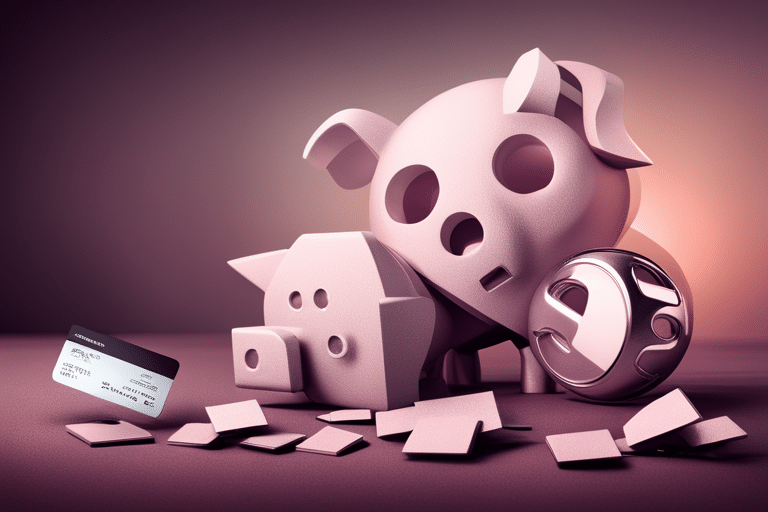Do you ever feel like credit cards are your own personal magic wands? With a simple swipe, you can conjure up new clothes, fancy dinners, and dream vacations. But be warned, dear reader! Behind the shimmering facade lies a treacherous realm of hidden dangers.
High interest rates lurk like fire-breathing dragons, ready to scorch your finances. Overspending and debt accumulation cast a spell that’s hard to break. And don’t even get me started on the wicked witches of identity theft and hidden fees!
Fear not, for in this article, we shall equip you with the knowledge to navigate these perilous waters and emerge victorious!
Key Takeaways
- High interest rates and impulsive buying habits can quickly accumulate credit card debt.
- Lack of financial discipline and budgeting can negatively impact financial health and stability.
- Credit card use can have psychological and emotional effects, causing stress and strain on relationships.
- Strategies such as budgeting, debt consolidation, and financial education can help avoid pitfalls and regain control.
The High Interest Rates
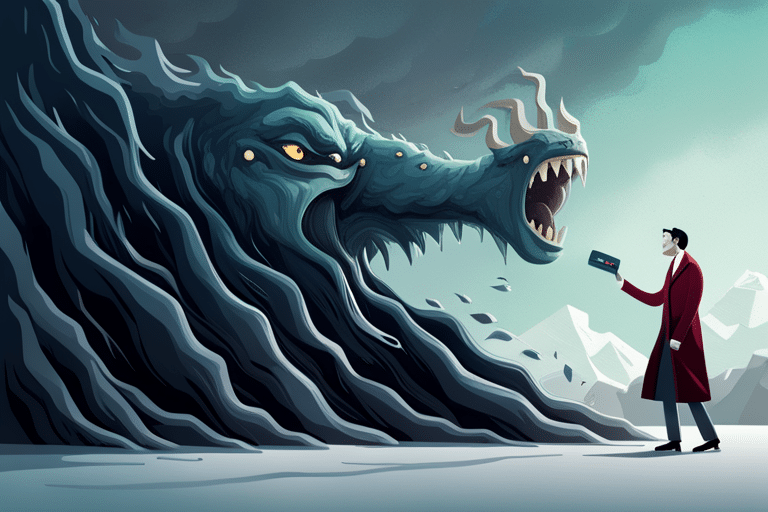
You need to be aware of the high interest rates on credit cards and how they can quickly accumulate debt.
Picture this: you’re strolling through the mall, minding your own business, when suddenly a credit card salesman approaches you with an irresistible offer. ‘Sign up for our amazing rewards program!’ he exclaims, his enthusiasm contagious.
You’re tempted – who doesn’t love free stuff? But hold on a minute! While those credit card rewards may seem enticing, it’s crucial to consider the high credit utilization and its consequences. Sure, earning points for every purchase is great, but if you’re not paying off your balance in full each month, that interest will sneak up on you faster than a ninja in disguise.
Before you know it, that dream vacation could turn into a nightmare of never-ending debt. So tread carefully my friend and think twice before swiping that plastic!
Overspending and Debt Accumulation

Hey there, shopaholic! Let’s talk about your impulsive buying habits. Those sky-high interest rates can leave you gasping for air, and the sneaky minimum payment trap. We’ll unravel the secrets behind these financial pitfalls and show you how to keep your wallet intact.
Impulsive Buying Habits
Avoid letting your impulsive buying habits lead you to rack up unnecessary credit card debt. We all know that feeling when you walk into a store and see those shiny new shoes or the latest gadget that promises to change your life. It’s hard to resist, right? But here’s the thing: impulsive buying consequences can have serious effects on your financial well-being.
That momentary thrill of making an impulse purchase can quickly turn into regret when you see the bill at the end of the month.
So, how do you avoid this trap? Start by taking a deep breath and asking yourself if you really need that item. Give yourself a cooling-off period before making any big purchases. And remember, it’s okay to treat yourself every now and then, but make sure it fits within your budget.
Now, let’s move on to another danger lurking in the world of credit cards: high interest rates…
High Interest Rates
Now let’s talk about the high interest rates that can sneak up on you when using credit cards.
Ah, the joys of swiping that magical piece of plastic and feeling like a financial wizard! But be warned, my friend, lurking behind those shiny rewards is a dark force called high interest rates.
They’re like those sneaky ninjas who creep up behind you when you least expect it. One moment you’re enjoying the perks of your cashback or travel points, and the next thing you know, BAM! You’re slapped with an outrageous interest rate that could make your head spin faster than a rollercoaster ride.
So, before diving into credit card rewards, make sure to read the fine print and beware of those treacherous high interest rates that can turn your financial dreams into nightmares.
Stay vigilant, masterful spender!
Minimum Payment Trap
Don’t fall into the minimum payment trap, my friend. It may seem like a convenient way to manage your credit card debt, but in reality, it’s like trying to put out a forest fire with a water pistol.
So, let me share some credit card utilization techniques that will help you escape this sneaky trap:
-
Pay more than the minimum: Seriously, my friend, paying just the minimum is like feeding a hungry bear one crumb and expecting it to leave you alone. Be bold and pay as much as you can.
-
Prioritize high-interest debts: Imagine you’re on a sinking ship with multiple holes. You wouldn’t waste time fixing small leaks first, right? Apply the same logic to your debts and tackle those with higher interest rates first.
-
Consider debt consolidation: It’s like bundling up all your little minions into one big superhero team. Consolidating your debts can make them easier to manage and potentially lower your interest rates.
Identity Theft and Fraud
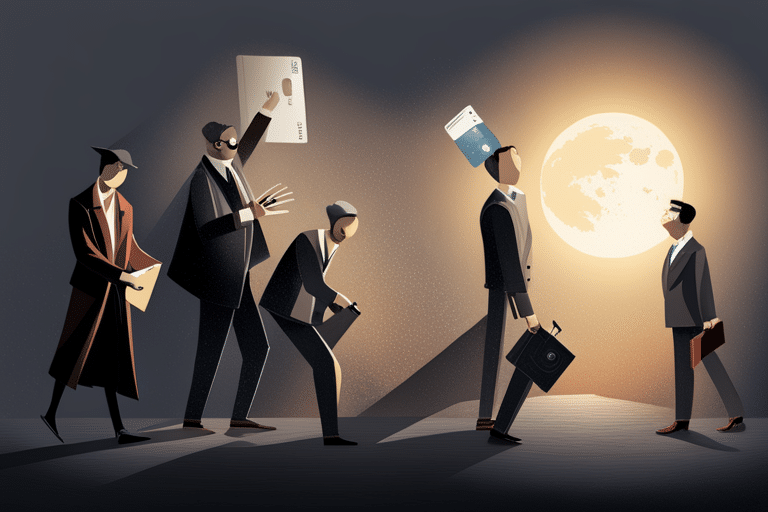
If you’re not careful, someone could easily steal your identity or commit fraud using your credit card information. Scary, right? But fear not! I’m here to share some tips on identity theft prevention and how to navigate the treacherous waters of online shopping risks.
Let’s start with a handy-dandy table to help you stay one step ahead of those sneaky thieves:
| Identity Theft Prevention | Online Shopping Risks |
|---|---|
| Use strong passwords | Beware of fake websites |
| Regularly monitor your accounts | Only shop on secure websites |
| Enable two-factor authentication | Avoid public Wi-Fi for transactions |
| Shred important documents before disposal | Be cautious with sharing personal information |
| Check your credit reports annually | Keep an eye out for phishing emails |
Hidden Fees and Charges

Be aware that there can be unexpected fees and charges when making online purchases.
Oh, hidden fees, the sneaky little creatures that lurk in the shadows of your credit card statement. They’re like ninjas, silently deducting money from your account without you even noticing. But fear not! Here are three ways to outsmart those crafty fees:
-
Read the fine print: It may be as exciting as reading a dictionary, but trust me, it’s worth it. Look for any mention of additional charges or hidden fees.
-
Compare prices: Don’t just click ‘buy’ on the first website you see. Shop around and compare prices to ensure you’re getting the best deal without any surprise charges.
-
Check your statements: Be vigilant! Keep an eye on your credit card statements every month to catch any suspicious charges before they become a problem.
Temptation to Make Impulse Purchases

Resist the urge to make impulse purchases and think carefully before clicking that ‘buy’ button. We’ve all been there, scrolling through online stores, feeling the tantalizing pull of a must-have item just waiting to be added to our cart. But before you give in to the siren call of instant gratification, let’s take a moment to consider the consequences of impulse buying.
Psychological factors play a big role in our impulsive spending habits. Retailers know this and use clever tactics to entice us into making unplanned purchases. From flashy advertisements to limited-time offers, they know just how to push our buttons and open our wallets.
To help you resist these temptations, here’s a handy table detailing some common psychological triggers and their potential consequences:
| Psychological Trigger | Consequence |
|---|---|
| Fear of Missing Out | Overspending |
| Emotional Shopping | Buyer’s Remorse |
| Social Pressure | Debt Accumulation |
| Instant Gratification | Regret |
Negative Impact on Credit Score
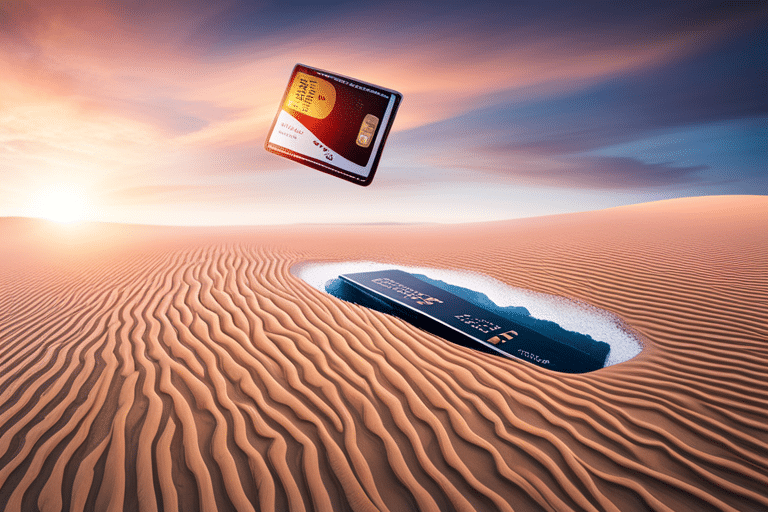
So, you’ve managed to resist the temptation of impulse purchases with your shiny credit card. Good for you! But be warned, my friend, there’s another danger lurking around the corner – the negative impact on your credit score. Here’s why it can be a real buzzkill:
-
Late payments: Forgetting to pay your credit card bill on time can send your credit score plummeting like a bungee jumper without a rope.
-
High utilization: Using too much of your available credit can make lenders think you’re desperate for cash and reduce borrowing opportunities faster than a cheetah chasing its dinner.
-
Opening too many accounts: Having multiple credit cards may seem cool, but it can actually hurt your credit score more than wearing socks with sandals.
These pitfalls might not seem like a big deal now, but trust me, they have long-term consequences. And speaking of consequences, let’s dive into the next section about ‘lack of financial discipline’…
Lack of Financial Discipline

You might think that lack of financial discipline isn’t a big deal, but let me tell you, it can wreak havoc on your financial future. Being financially irresponsible and having no savings is like trying to drive a car without any brakes – disaster waiting to happen! Picture this: On one side of the table, we have your income and expenses nicely balanced, living within your means. On the other side, we have reckless spending and zero savings. Take a look:
| Responsible Financial Behavior | Financial Irresponsibility |
|---|---|
| Saving for emergencies | Living paycheck to paycheck |
| Budgeting and planning | Impulsive buying |
| Investing for the future | Accumulating debt |
| Building wealth | No safety net |
| Achieving financial goals | Constant stress |
See what I mean? It’s like night and day! Lack of financial discipline can lead to all sorts of trouble down the road. And speaking of roads, let’s talk about the difficulty in budgeting and financial planning…
Difficulty in Budgeting and Financial Planning

Budgeting and financial planning can be challenging, especially when it comes to managing your expenses and saving for the future. But fear not, brave budgeter! We’re here to help you navigate these treacherous waters with a few tips and tricks.
-
Tracking Expenses: It’s like playing detective, but without the cool gadgets. Keep a record of every penny you spend. From that overpriced latte to those impulse buys on Amazon, no expense shall escape your watchful eye!
-
Long-Term Financial Stability: Picture yourself in retirement, sipping cocktails on a tropical beach while your friends are still stuck in their cubicles. Ahh… paradise! By diligently budgeting now, you’ll ensure a smoother journey towards that dreamy destination.
-
The Sneaky Little Expenses: Beware of those pesky recurring subscriptions or monthly fees that quietly chip away at your wallet. Cancel that gym membership you never use (we won’t tell!) and bid farewell to unnecessary expenses.
Limited Purchase Protections
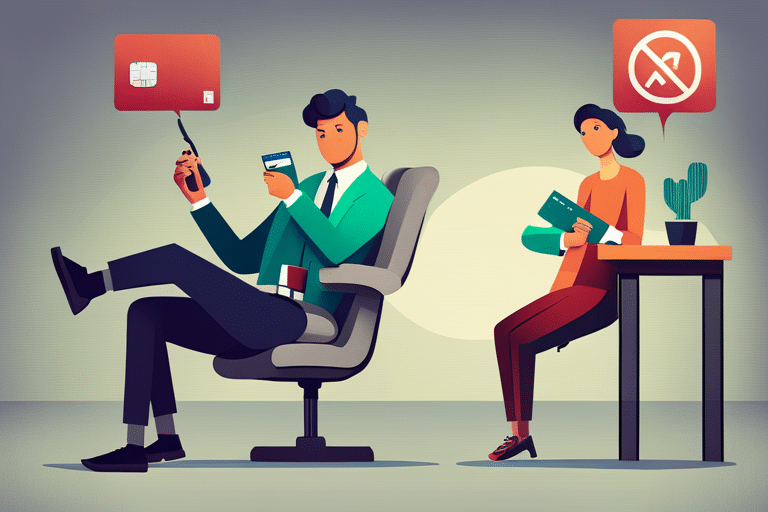
When it comes to limited purchase protections, it’s important to be aware of the potential risks and take necessary precautions. Sure, credit cards can be convenient and flashy, but they often come with fine print that can leave you vulnerable to decreased savings. Let’s break it down in a fun table:
| Potential Risks | Necessary Precautions | Decreased Savings |
|---|---|---|
| Fraudulent charges | Regularly monitor your statements for any suspicious activity | Lost money on unauthorized purchases |
| Disputes with merchants | Keep receipts and document communication for easier resolution | Paid for faulty goods or services |
| Limited warranty coverage | Research and choose cards that offer extended warranties or purchase protection plans | Stuck paying for repairs or replacements |
Potential for Decreased Savings
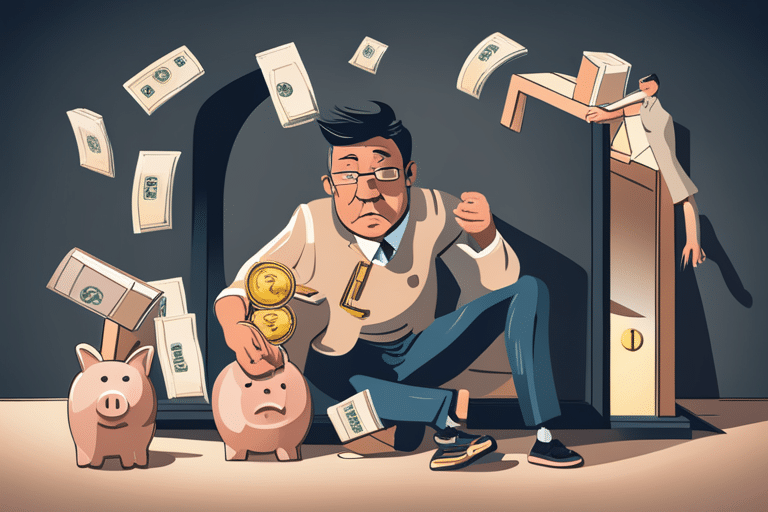
So, you’ve learned about the limited purchase protections that come with using credit cards. But let me tell you, there’s another hidden danger lurking around the corner. Brace yourself for the potential of decreased savings!
Picture this: You’re enjoying your retirement years, sipping on a margarita by the beach… until you realize your retirement fund is looking a little slim. And why is that? Well, my friend, it could be because of those sneaky credit card habits.
Here’s how they can sabotage your savings:
-
Reduced Retirement: By relying too heavily on credit cards and not saving enough, your golden years might not be so shiny after all.
-
Emergency Fund Depletion: Credit card debt can drain your emergency fund faster than you can say ‘oops.’
Impact on Future Financial Goals
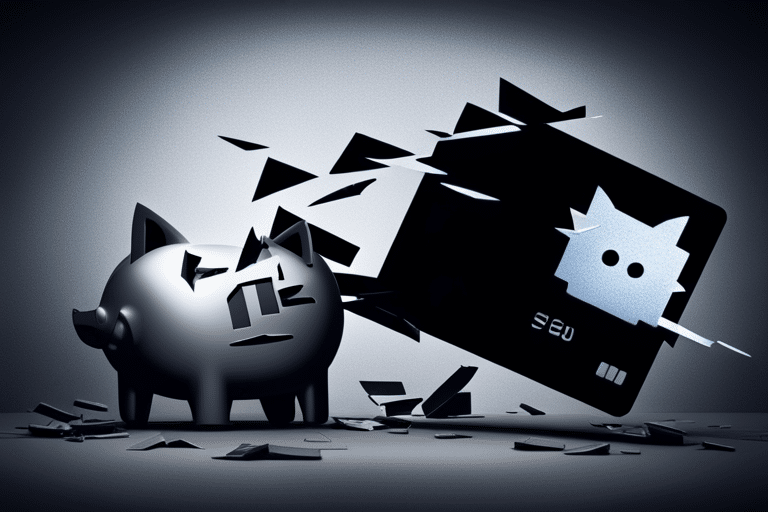
Imagine the disappointment of not being able to achieve your future financial goals due to the impact of relying too heavily on credit cards. It’s like trying to climb a mountain with a pair of flip flops – you’re bound to slip and fall.
When it comes to long term financial planning and future financial stability, credit cards can be a slippery slope. Sure, they may offer convenience and perks in the short term, but if you rely on them too much, you could find yourself sliding down into a pit of debt.
Building wealth takes time and discipline, so don’t let credit cards derail your plans. Take control of your finances and avoid becoming dependent on credit, because when that happens, your cash flow will go from a steady stream to a trickle in no time.
Now let’s explore how this dependency on credit leads to reduced cash flow and all the problems that come with it.
Dependency on Credit and Reduced Cash Flow
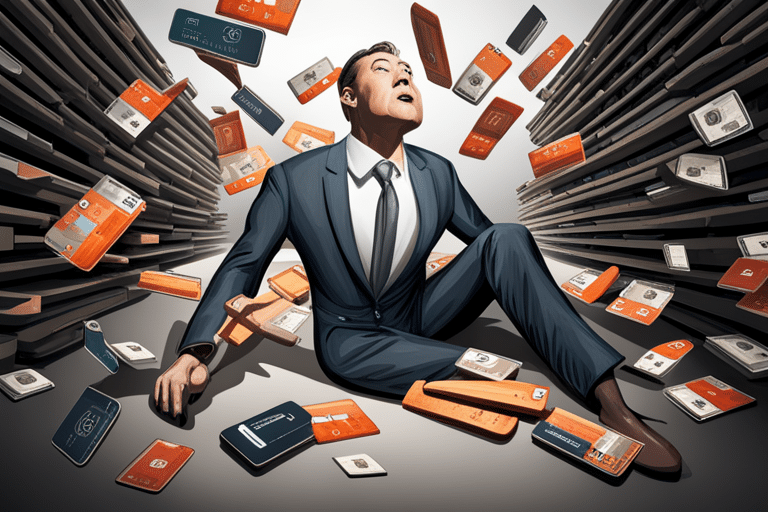
If you become too reliant on credit, your cash flow will dwindle, causing a variety of problems in your financial life. Picture this: you’re strolling through the mall, flashing that shiny piece of plastic like it’s going out of style. But here’s the catch – relying on credit too much can lead to reduced savings and hinder your journey towards financial independence.
So, before you whip out that card again, keep these dangers in mind:
-
Reduced Savings: Using credit cards for every purchase means less money in your bank account. And let’s face it, those interest rates aren’t doing you any favors either.
-
Financial Independence: Depending on credit too heavily might make you feel like a hotshot spender now, but it could delay achieving true financial freedom in the long run.
-
Limited Flexibility: When all your cash is tied up in debt payments, spontaneous adventures or emergency expenses become a distant dream.
Stress and Anxiety From Debt Repayment
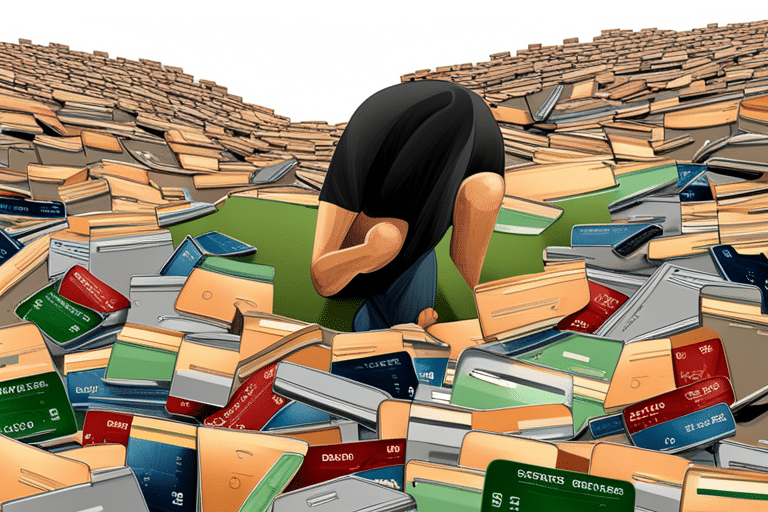
Being overly reliant on credit can lead to stress and anxiety when it comes to repaying your debts. But fear not, dear reader! There are ways to manage the stress and keep your sanity intact.
First, take a deep breath and remind yourself that you’re not alone in this. Many people have found themselves in debt and successfully navigated their way out of it.
Second, try some stress management techniques like meditation or exercise to help calm your mind. And if all else fails, don’t hesitate to seek professional help from a financial advisor or credit counseling service. Remember, there’s no shame in asking for assistance when you need it.
By taking control of your debt and managing your stress levels, you’ll be one step closer to regaining financial freedom.
Now let’s delve into the negative effects that excessive debt can have on relationships and mental health…
Negative Effects on Relationships and Mental Health
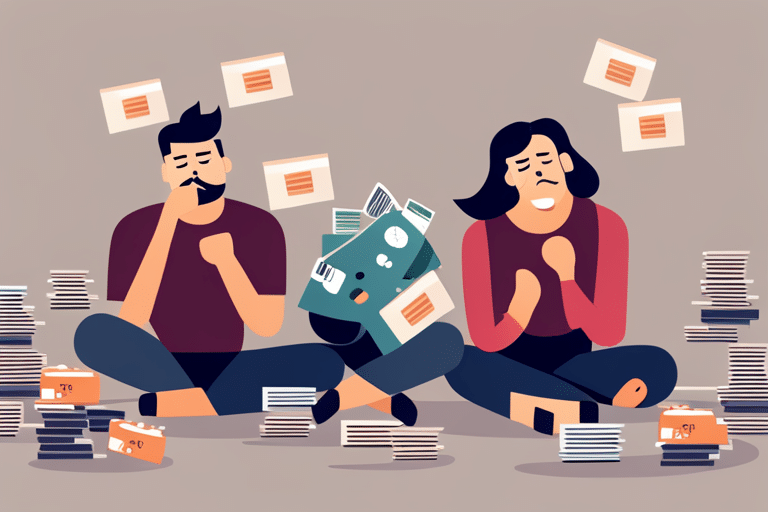
Excessive debt can strain relationships and take a toll on your mental health. But hey, don’t worry! We’re here to shed some light on the dark side of credit card debt. So grab your popcorn and let’s dive in!
Here are three ways that debt can wreak havoc on your relationships and mental well-being:
-
Financial Fights: Money troubles can turn any lovey-dovey couple into a bickering duo faster than you can say ‘interest rates!’ Arguments about spending habits, bills, and who ate the last slice of pizza become all too common.
-
Constant Stress: Debt has a way of creeping into every corner of your mind. It’s like that annoying song stuck in your head – except instead of catchy lyrics, it’s thoughts like ‘How will I ever pay this off?’ or ‘Will we ever be financially secure?’
-
Emotional Rollercoaster: Picture this: one minute you’re dreaming about tropical vacations, the next you’re drowning in a sea of bills. Debt messes with your emotions big time. You’ll feel overwhelmed, anxious, and maybe even a little hopeless.
Now that we’ve uncovered the not-so-fun effects of debt on relationships and mental health, it’s time to take action! Stay tuned for our next installment where we’ll reveal some tips to avoid these pitfalls and regain control over your financial freedom.
Frequently Asked Questions
Can Credit Cards Actually Help Improve My Credit Score?
Sure, credit cards can help improve your credit score! By using them responsibly, paying bills on time, and keeping your credit card utilization low, you’ll earn rewards and build a solid credit history. It’s a win-win situation!
Are There Any Benefits to Using Credit Cards for Everyday Expenses?
Using credit cards for everyday expenses can have its perks! With credit card rewards programs, you can earn cash back or other benefits. Just be sure to avoid the hidden dangers that come with them.
How Can I Protect Myself From Identity Theft and Fraud When Using Credit Cards?
To protect yourself from identity theft and fraud when using credit cards, be vigilant! Keep an eye on your statements, use secure websites, and shield your PIN. Don’t let those sneaky thieves ruin your shopping spree!
Are There Any Hidden Fees or Charges That I Should Be Aware of When Using Credit Cards?
Watch out for those sneaky hidden fees and charges when using credit cards! They can really add up and put a dent in your wallet. But don’t worry, we’ve got some tips on how to avoid them and minimize the costs of using plastic.
Can Using Credit Cards Actually Lead to a Decrease in My Savings?
Using credit cards can actually decrease your savings. In fact, studies show that people with credit card debt have less money saved for emergencies and long-term goals. So be cautious and avoid those sneaky interest charges!
Conclusion
So there you have it, my friend! The hidden dangers of using credit cards are like sneaky little gremlins waiting to pounce on your financial well-being.
But fear not, for armed with this knowledge, you can slay those gremlins and avoid the pitfalls of high interest rates, overspending, identity theft, hidden fees, impulse purchases, and more!
Don’t let credit cards be your kryptonite; instead, use them wisely and responsibly to conquer your financial goals.
Stay strong, stay smart, and remember: you’re the boss of your money!
Happy spending (within reason)!

